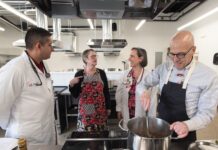
The School of Nursing at the University of Louisville celebrates a significant and storied history with its Golden Jubilee in 2024. A reception held on April 12 honored 50 years of educating and preparing Cardinal nurses for their distinctive careers.
Interim Dean Mary DeLetter took a moment to talk with UofL News about the community impact of UofL’s School of Nursing. From her entrance into the school as a 17-year-old nursing student in 1976 to being named interim dean in 2022, the school has served as bookends for DeLetter’s dedicated nursing career.
UofL News: Your history with the School of Nursing is almost as long as the school’s history. Tell us more about that.

DeLetter: I started at UofL as a first-year associate degree nursing student at age 17 in 1976. I stayed in the program two more years and graduated with a bachelor’s degree in 1980. After my graduation, I did work at different hospitals in Louisville, then moved to North Carolina where I obtained my master’s degree. I returned to Kentucky and after working in Lexington for many years, I was recruited to UofL in 2017, where originally, I taught part-time. I then became director of the RN to BSN program, then associate dean for academic affairs, and in 2022, was asked by the provost to serve as interim dean. As of 2024, that’s a span of 46 years in nursing.
It’s been a huge honor and privilege to have been in this School of Nursing at the beginning – two years into the start – and now to have held this position. For me to have come in this big circle and to be able to close the loop on my career, having had the privilege to serve at this level, is something I will always treasure.
UofL News: What makes UofL’s School of Nursing distinctive?
DeLetter: From the very beginning, expectations of students were high; we were strong, and our faculty were strong. We were right on the cusp of a shift in the profession from subservient to autonomous.
We were guided to really use our knowledge, our science, our critical thinking, our assessment skills to make decisions. I don’t think all schools were there yet.
We were encouraged to push forward in our education so that we would have a seat at the table with other health care professionals.
I learned at an early age that the patient’s family is whoever the patient says they are. It was the mid-70s and people didn’t all talk like that, but we were very open to diversity. We were ahead of our time. Today, we still have that vitally and strong commitment to our students and to the community.
UofL News: In addition to the massive technological and digital advancements from the ’70s through today, what are some of the most significant changes in the field?
DeLetter: I sometimes wonder how students still do it in a four-year degree. They’re spending the same amount of time now that we spent 40 years ago to learn so much more.
There are so many more drugs, medications, treatments, types of surgeries. When I first became a nurse, patients were admitted the day before a surgery, it could be something as simple as a carpal tunnel surgery, and they stayed for two or three days afterward. Now of course, for that and much bigger surgeries, they don’t stay.
We also have so much more knowledge about pathophysiology and treatment and outcomes. An important thing that’s changed for nurses is our ability to monitor what we do and how we have an impact on the patient. We have evidence-based protocols, and nurses are now expected to monitor and prevent conditions from developing like pressure ulcers, falls, infection from urinary catheters or central line IV access or ventilator-associated pneumonia.
Simulation education is hugely different. We practiced injections on each other. Today, students have excellent training in simulation. We also have a more collaborative health care team than 40 years ago.
Another momentous change in nursing has been the educational level of the faculty. Years ago, a new dean came and told everyone they needed to get doctoral degrees. It was pivotal in reframing the School of Nursing to be recognized as a credible discipline in higher education.
UofL News: What challenges do today’s nurses have that they didn’t have years ago?
DeLetter: The acuity of illnesses is greater. We are more challenged by societal problems of gun violence and domestic violence. Bills have gone before the state to decriminalize errors by nurses and to hold patients criminally liable when they assault nurses or other health care providers. The world is busier and more complicated.
Some students have bigger burdens to carry. Some are single parents or living in domestic violence situations. We have a student loan debt crisis. There’s discussion everywhere about the mental health crisis of many students on college campuses, not just ours, but across the nation.
UofL News: In what positive ways have you seen our nursing students change over the years?
DeLetter: Students have a broader view because of their access to the world, so they have a better understanding of global health. Also, they have a better understanding of the impact of the health of the community. We think broadly about social determinants of health that affect patients across the continuum of their health care.
UofL News: How has our nursing program impacted our community?
DeLetter: We’ve graduated over 7,000 nursing students in the last 50 years so there’s no question our graduates are everywhere.
We are well known in hospitals and other agencies for our quality graduates. We contribute to dozens of community activities every year. We provide service to people through our community health courses, we have students in schools, homeless shelters and in all kinds of agencies providing care to clients. When you have students doing something for them, and they wear that UofL shirt, that’s going to have a positive impact. The university is socializing students to care about others.
UofL News: What is one thing that you hope to see happen in nursing in the next 50 years?
DeLetter: I hope we reach a point where the workforce shortage is not so dire.
Another thing I would like to see is the continued proliferation of the research and evidence-based practice changes in patient care. We continue to give diligent care as bedside clinicians; we continue to advance the science and we continue to serve the communities where we live and work.
































